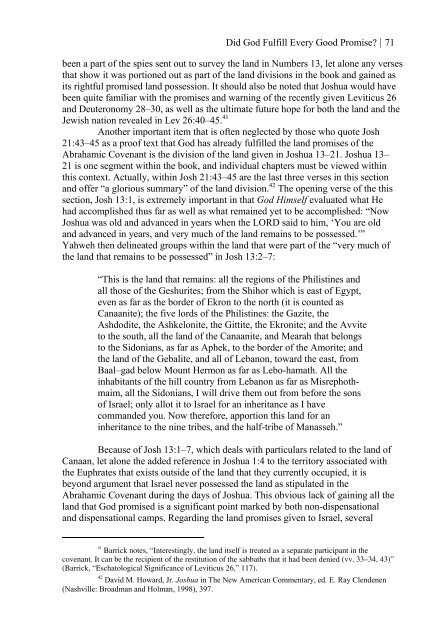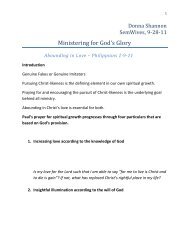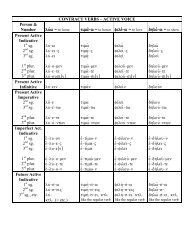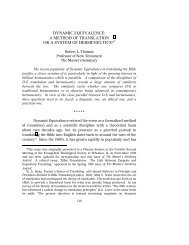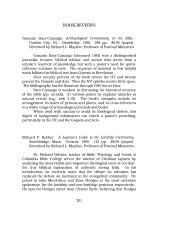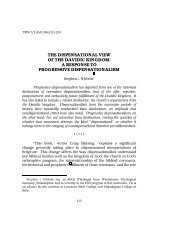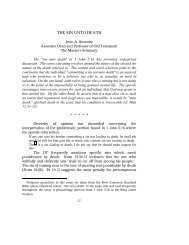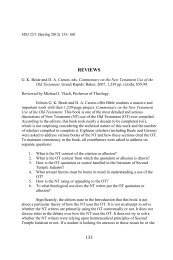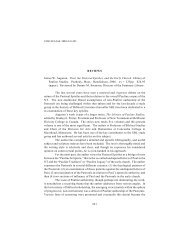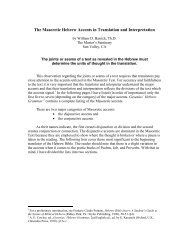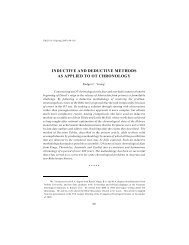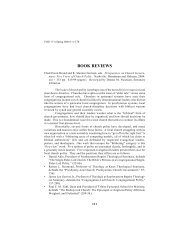Did God Fulfill Every Good Promise? - The Master's Seminary
Did God Fulfill Every Good Promise? - The Master's Seminary
Did God Fulfill Every Good Promise? - The Master's Seminary
Create successful ePaper yourself
Turn your PDF publications into a flip-book with our unique Google optimized e-Paper software.
<strong>Did</strong> <strong>God</strong> <strong>Fulfill</strong> <strong>Every</strong> <strong>Good</strong> <strong>Promise</strong>? | 71been a part of the spies sent out to survey the land in Numbers 13, let alone any versesthat show it was portioned out as part of the land divisions in the book and gained asits rightful promised land possession. It should also be noted that Joshua would havebeen quite familiar with the promises and warning of the recently given Leviticus 26and Deuteronomy 28–30, as well as the ultimate future hope for both the land and theJewish nation revealed in Lev 26:40–45. 41Another important item that is often neglected by those who quote Josh21:43–45 as a proof text that <strong>God</strong> has already fulfilled the land promises of theAbrahamic Covenant is the division of the land given in Joshua 13–21. Joshua 13–21 is one segment within the book, and individual chapters must be viewed withinthis context. Actually, within Josh 21:43–45 are the last three verses in this sectionand offer “a glorious summary” of the land division. 42 <strong>The</strong> opening verse of the thissection, Josh 13:1, is extremely important in that <strong>God</strong> Himself evaluated what Hehad accomplished thus far as well as what remained yet to be accomplished: “NowJoshua was old and advanced in years when the LORD said to him, ‘You are oldand advanced in years, and very much of the land remains to be possessed.’”Yahweh then delineated groups within the land that were part of the “very much ofthe land that remains to be possessed” in Josh 13:2–7:“This is the land that remains: all the regions of the Philistines andall those of the Geshurites; from the Shihor which is east of Egypt,even as far as the border of Ekron to the north (it is counted asCanaanite); the five lords of the Philistines: the Gazite, theAshdodite, the Ashkelonite, the Gittite, the Ekronite; and the Avviteto the south, all the land of the Canaanite, and Mearah that belongsto the Sidonians, as far as Aphek, to the border of the Amorite; andthe land of the Gebalite, and all of Lebanon, toward the east, fromBaal–gad below Mount Hermon as far as Lebo-hamath. All theinhabitants of the hill country from Lebanon as far as Misrephothmaim,all the Sidonians, I will drive them out from before the sonsof Israel; only allot it to Israel for an inheritance as I havecommanded you. Now therefore, apportion this land for aninheritance to the nine tribes, and the half-tribe of Manasseh.”Because of Josh 13:1–7, which deals with particulars related to the land ofCanaan, let alone the added reference in Joshua 1:4 to the territory associated withthe Euphrates that exists outside of the land that they currently occupied, it isbeyond argument that Israel never possessed the land as stipulated in theAbrahamic Covenant during the days of Joshua. This obvious lack of gaining all theland that <strong>God</strong> promised is a significant point marked by both non-dispensationaland dispensational camps. Regarding the land promises given to Israel, several41Barrick notes, “Interestingly, the land itself is treated as a separate participant in thecovenant. It can be the recipient of the restitution of the sabbaths that it had been denied (vv. 33–34, 43)”(Barrick, “Eschatological Significance of Leviticus 26,” 117).42 David M. Howard, Jr. Joshua in <strong>The</strong> New American Commentary, ed. E. Ray Clendenen(Nashville: Broadman and Holman, 1998), 397.


